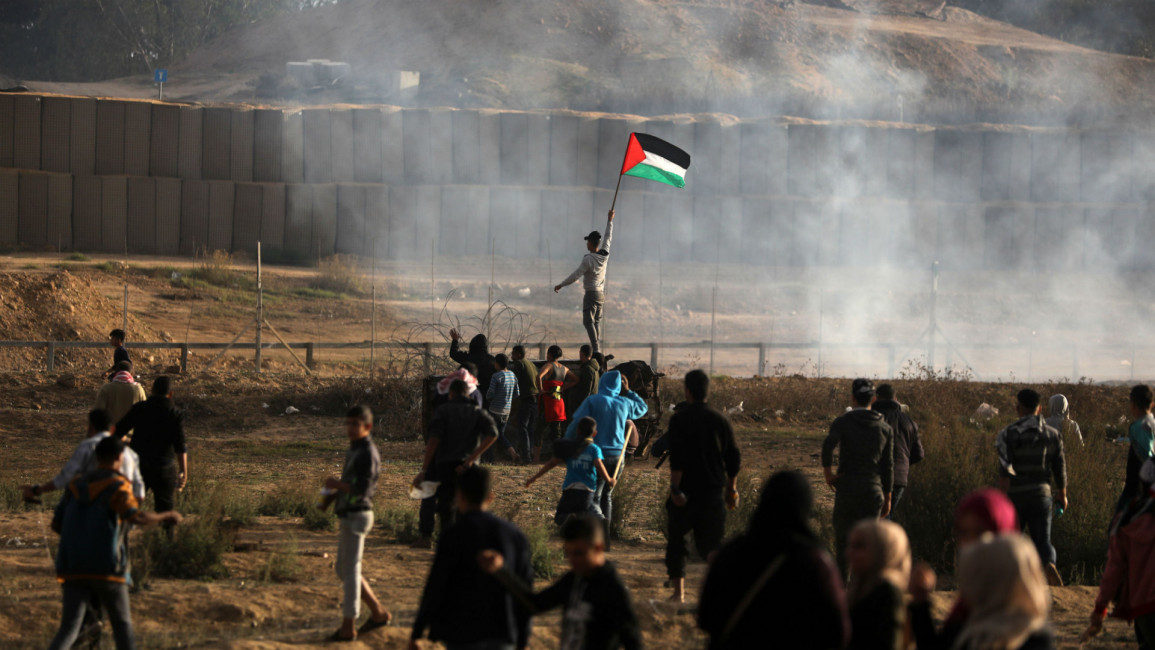Amid unbearable conditions, besieged Palestinians in Gaza to march again on Israel border
Palestinian groups announced on Monday that they will resume marches and other activities along the eastern borders of the besieged Gaza Strip on March 30 in a bid to express their anger at the ongoing Israeli violations against the Palestinians.
On Saturday, various Gaza-based factions formed a new "National Commission to Defend and Support the Palestinians of the Israeli-occupied lands of 1948." Including national and Islamic factions, as well as civil and social institutions, the new commission is an extension of the Commission of the 18-month Great Return March that was launched in 2018 and had demanded Israel allow Palestinians to return to their original homes that they were expelled from during Israel's creation in 1948.
Referred to as the Nakba or 'catastrophe' by Palestinians, at least 700,000 Palestinians were expelled from their villages by Israeli forces during the 1948 war. Many of the Palestinians took refuge in nearby countries or other Palestinian territories, among which was Gaza. Some Palestinians were able to remain, and today carry Israeli citizenship.
Palestinians in #Gaza Strip hit by surging food, fuel prices amid devastating Israeli siege - https://t.co/4Bzh8qIbhL on @The_NewArab #Palestine pic.twitter.com/Bf2nD2wTV1
— al whit🍉 (@soitiz) March 7, 2022
Khalid al-Batsh, a senior official at the Palestinian Islamic Jihad (PIJ), told The New Arab that the new commission was formed "to express our solidarity with our Palestinian brothers in the lands of 1948."
"We will not allow the Israelis to Judaize, annexe and confiscation our Palestinian lands through displacing our people once again," he added.
Israel should repeat 1948 military operation in Negev against Palestinians, says general #BDS https://t.co/F0ZtONIeeX
— Ruthαnαsıα #Palestine #BDS #UniteAgainstZionism ✊✌ (@Ruthanasia) January 17, 2022
For his part, Mohsen Abu Ramadan, the head of the commission, told The New Arab that "at a time when all eyes of the world are directed towards the Russian-Ukrainian conflict, Israel continues its violations against our people and does its best to divide us geographically."
"our new commission aims at emphasizing the unity of the Palestinian people in all their political, national and geographical locations (…) from now, all the Palestinians, in the West Bank, Jerusalem, lands of 1948 and the Gaza Strip will be participated in the popular activities to prevent Israel from completing its colonial project," Abu Ramadan said.
While the final plan regarding the types of activities has yet to be approved, an official within the commission, who requested anonymity, told The New Arab that on March 30, the factions are nevertheless expected to launch popular demonstrations along the eastern border separating the coastal enclave from the Israeli cities.
"This means that we may allow the youthful crowd to launch incendiary and explosive balloons as in the past," the official said, adding that "we have our right to express our anger on Israel over its violations against our people."
According to the official, other activities are planned to be held in the cities of the coastal enclave, as well as in front of the headquarters of international organizations in the Gaza Strip.
For his part, Mohammed al-Batniji, a Gaza-based resident is excited to participate in the upcoming events. The 38-year-old father of four told The New Arab that he had previously joined the March to Return in 2018 and persisted in demonstrating for months.
"For more than 10 years, Israel singles out us as Palestinians and follows the principle of divide-and-rule to implement all its colonial and settlement plans," the al-Batniji said, adding, "but during the last Israeli war in May 2021, our brothers in the lands of 1948 supported us though organizing protests against the Israeli army."
Human Rights Watch says Israeli war crimes are apparent in the 11-day attacks on occupied Gaza from May. pic.twitter.com/HX2FAyMPmu
— AJ+ (@ajplus) July 31, 2021
Last May, Israel launched an 11-day military campaign on the Gaza Strip, following a barrage of rockets that emanated from Gaza fired in response to Israel's encroachment on the Al Aqsa Mosque, the third-holiest site for Muslims.
During the wave of fierce fighting, Israeli warplanes carried out hundreds of air raids on the Gaza Strip, home to nearly two million people, killing over 250 and wounding up to 2,000. At the same time, Palestinian armed factions in Gaza fired thousands of rockets at Israel, killing more than 10. Since then, a fragile cease-fire has held, despite the ongoing violations on part of Israel.



